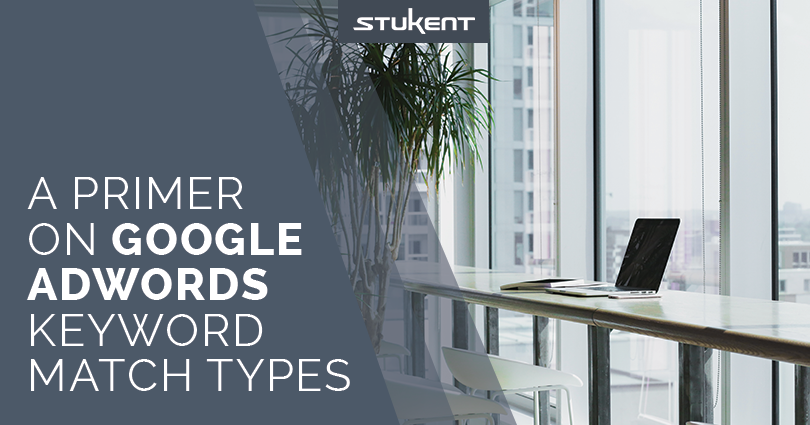One of the great benefits of PPC advertising is that you can choose which keywords you want your ads to show for. For example, if you are a flower store in Boston, you can bid on keywords, such as:
- Boston flower stores
- Flower stores in Boston
- Stores that sell flowers in Boston
By bidding on keywords that make sense for your business, you primarily show ads to users searching for your services. Along with a highly-targeted audience, you also save money by NOT showing ads to those searchers who have a low purchase intent.
Once you’ve determined which keywords to use, it’s critical to utilize the correct match types. Keyword match types dictate how specific or broad individual queries can be that trigger your ad. As an example, if you bid on the exact match of “Boston flower stores,” only this query and potential close variants, such as “Boston flower store,” will show your ads. However, if you bid on the broad match of “Boston flower stores,” a query such as “flowers in Boston and other towns,” can result in your ad being shown.
Though AdWords lists 4 match types on its support page, there are technically 6. They include:
- Exact match
- Exact match, close variants
- Phrase match
- Phrase match, close variants
- Broad match
- Modified broad match
Along with the various match types, you can add negative keywords. If these keywords are present in a query, your ad will not show. Using our flower store example, if the flowers tend to be on the expensive side, we may want to add bargain-based terms as negatives. If we add “cheap” as a negative keyword, a search for “Boston flower store cheap,” will not show an ad. In conjunction with match types, negative keywords help to reduce poor quality traffic.
Let’s review each match type.
Exact Match
This match type is the most specific and is designated with brackets. By bidding on the exact match of the keyword, [Boston flower shops], we are telling Google that we only want this query to trigger our ads. As you’ll see in the next section, Google does allow close variants to show, but we’ll get into that situation in a minute.
Aside from showing the highest user intent, exact match keywords are important in accounts limited by budget. Keywords can be very expensive. In some industries, it takes bids of over $100 to remain competitive. If you are going to be paying this much for your ad to show and have budget constraints, exact match is the way to go. Additional options like geotargeting and time of day bid modifiers will help conserve budget, but exact match is the surest way to get the most qualified traffic.
Exact Match, Close Variants
Google doesn’t allow you to bid on close variants of keywords, but rather, uses its own discretion to show your ads for queries it deems relevant. These queries may include singular or plural versions of your keywords, filler words, and other terms that mean the same thing. If we bid on the keyword [Boston flower shops], our ads may show for any of these queries:
- Boston flower shop (singular version)
- Boston flower store (synonym of shop)
- Boston flowers shop (plural version of “flowers”)
As you can imagine, not all close variants will be deemed relevant queries. That’s why you’ll need to review your search terms report on a consistent basis to find negative keywords to add to your campaigns. If you don’t want your ad to show for “store” related queries, you will want to add this term as a negative keyword.
Phrase Match
Phrase match is like exact match in that users must type in the correct word order for an ad to show, but with phrase, there can be terms before or after the keyword. If we bid on the keyword, [Boston flower shop], in exact match, only this query and close variants would trigger our ad. By using phrase match, designated with quotation marks, our ad would show for queries such as “Boston flower shop near me” and “northern Boston flower shop.” You are telling Google that word order still matters, but there can be additional terms.
The hesitation advertisers have with phrase match is that it requires many variations of the keyword so all permutations are covered. To cover all the terms in our example, we would need 2 phrase match keywords:
- “Boston flower shop”
- “flower shop Boston”
When you have 100s of keywords, covering all the phrase match permutations is inefficient, especially when many will receive little to no traffic. Thus, modified broad match, which we’ll discuss later, comes in handy.
Phrase Match, Close Variants
The same principle that we discussed in the exact match, close variant section, applies here. Google will take liberties to show your ads for variants that it deems relevant. If we are bidding on the phrase match of “Boston flower shop,” potential close variant queries may include:
- Boston flower shops (plural version)
- Boston flower stores (synonym of shop and plural version)
Again, be adamant about reviewing your search terms report to find potential negative keywords.
Broad Match
This match type is the most generic and has the greatest potential for irrelevant traffic. A broad match keyword doesn’t need to follow a certain word order and will also trigger your ad for similar searches. For example, bidding on the broad match keyword of “Boston flower shop,” could show an ad for any of these queries:
- Flower shops in Boston
- Boston flower kiosk
- Boston flowers
- Where to plant flowers in Boston
- Shops that sell flowers
You’ll notice that many of these queries are irrelevant and some don’t even include all our designated terms. Google takes liberties based on what its algorithm sees as popular searches and users’ search histories. Broad match is like the wild west in that anything goes.
So, knowing that broad match has the potential to waste money, why would you want to use it? There are two primary reasons. The first is for keywords with low search volume. For example, e-commerce stores with 1000s of items often have products and/or SKUs that few users search. Though you could bid on the exact match keywords of these items, Google will generally slap a “low search volume” tag. This tag essentially eliminates your ads for showing on these keywords because few users are searching for them. The workaround is to bid on the broad match keyword. Though you will see some irrelevant traffic, search volume and costs will most likely be low, allowing for cheaper clicks and possibly conversions.
The second reason for using broad match is that it acts as a keyword research tool. Since many permutations will be triggered, there is the opportunity to find new keywords to add to your campaign. When using this strategy, you will want to set a low keyword bid. Even if you do receive a fair amount of traffic, the cost will be minimal.
Modified Broad Match
Earlier, I mentioned that modified broad match is a good alternative to 100s of phrase match keywords. Here’s why.
Modified broad match requires a plus sign on all terms in your keyword that must be in the query. Word order doesn’t matter with modified broad match. If the term is in the query, your ad can show. Let’s again look at “+Boston +flower +shop.” I’m telling Google that my ad can show for any query that includes all three of these terms. Queries may include:
- Flower shop in Boston
- Boston shops that have flowers
- Where can I find a flower shop in Boston?
If only two of the terms are necessary for the query, I can just put a plus sign on them. Maybe I only care that “Boston” and “flower” are included in the query. My ad would then show for queries such as:
- Boston flower stores
- Flower in Boston
- Flowers near Boston
Keep in mind that close variants will still show with broad match, even though there isn’t a separate match type. In addition, you will inevitably see irrelevant queries so make sure you are reviewing the search terms report.
Conclusion
It’s not enough to know which keywords to bid on. You must determine the correct match types based on your budget and goals. The combination of finding the right match types while utilizing negative keywords will result in more highly-qualified, and hopefully better-converting traffic.






